
Marillion are a British neo prog band, formed in Aylesbury, Buckinghamshire, in 1979. They emerged from the post-punk music scene in Britain and existed as a bridge between the styles of punk rock and classic progressive rock, becoming the most commercially successful neo-prog band of the 1980s.
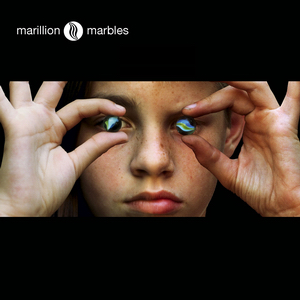
Marbles is the 13th studio album from rock band Marillion, released in 2004. Unlike their previous studio album, Anoraknophobia (2001), which was financed largely by a preorder campaign, the band funded the recording, and it was the publicity campaign that fans financed for the album. Those fans who pre-ordered the album received an exclusive 2-CD "Deluxe Campaign Edition" with a booklet containing the names of everyone who pre-ordered before a certain date. The public release date of the retail single-CD version of the album was 3 May 2004 while a plain 2-CD version was made available from the band's website. A limited edition was released on white multicoloured vinyl by Racket Records on 13 November 2006.
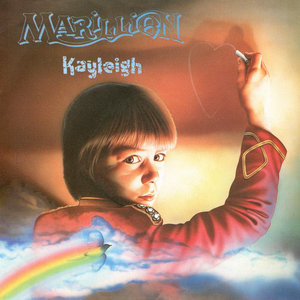
"Kayleigh" is a song by British neo-prog band Marillion. It was released as the first single from the concept album Misplaced Childhood. It is the band's most successful single in the UK, where it peaked at number two and stayed on the UK Singles Chart for a total of 14 weeks. It also became the band's most successful single worldwide, reaching the top 10 in Ireland, Norway, and West Germany. In the United States, it gave the band their sole appearance on the Billboard Hot 100 chart, reaching number 74 in October 1985.

Afraid of Sunlight is Marillion's eighth studio album, released in 1995. It was their last for EMI.
Dave Meegan is an Irish record producer, born in Dublin in 1963. Meegan is best known for his work with Marillion.

More Hits by The Supremes is the sixth studio album by Motown singing group the Supremes, released in 1965. The album includes two number-one hits: "Stop! In the Name of Love" and "Back in My Arms Again", as well as the Top 20 single "Nothing but Heartaches".
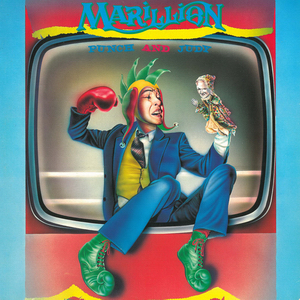
"Punch and Judy" is a song by the British neo-prog band Marillion. It was the first single from their second studio album Fugazi. The lyrics of the song are about a marriage gone bad.

"When You're Gone" is a song by Canadian musician Bryan Adams featuring English singer Melanie C, from the former's eighth studio album, On a Day Like Today (1998). The song was written by Eliot Kennedy and Adams, while produced by Adams and Bob Rock. It was released by A&M Records on November 30, 1998, as the second single from the album in addition to being Melanie C's first single outside the Spice Girls. Musically, it contains genres of pop, pop rock and soft rock, and is performed as a duet between Adams and Melanie C with a guitar solo.

High Energy is the twenty-eighth studio album by American girl group the Supremes, released in 1976 on the Motown label. The album is the first to feature Susaye Greene; former member of Stevie Wonder's Wonderlove; and is notable for featuring the last Billboard Hot 100 Top 40 pop hit for the group, "I'm Gonna Let My Heart Do the Walking". Of their 1970s releases, High Energy is the second-highest charting album on the US Billboard 200, the first being Right On (1970). In Canada, High Energy is the highest-charting Supremes album since TCB (1968).

Mary, Scherrie & Susaye is the twenty-ninth and final studio album by The Supremes, released in 1976 on the Motown label. It featured the final line-up for the Supremes, composed of original Supreme Mary Wilson and latter-day members Scherrie Payne and Susaye Greene. All three Supremes take leads on the album. The album was a mixture of disco dance tracks (Hi-NRG) and R&B ballads. Payne and Greene mostly took over the dance tracks while Wilson performed the ballads. The album was released in October 1976, nine months before the trio disbanded.

Somewhere Else is the fourteenth studio album by British neo-prog band Marillion. It was released by the band's own label, Intact Records, in the United Kingdom on 9 April 2007. Produced by Michael Hunter, the album was recorded during 2006 at The Racket Club in Buckinghamshire, except the track "Faith", written during the Marbles sessions and recorded the previous year.
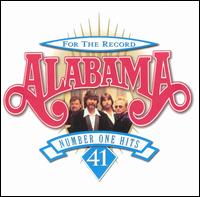
For the Record: 41 Number One Hits is a two-disc, 44-track greatest hits package released by the American country/Southern rock band Alabama.

"I Don't Wanna Get Hurt" is a song by American singer-songwriter Donna Summer. It was the second single from Another Place and Time and, like other tracks from the album, was produced by Stock Aitken Waterman. The song was remixed from the album version and released on May 8, 1989, by Warner Bros. Records, in several European countries. It was a top ten hit in UK and the second most-successful single from the album, behind "This Time I Know It's for Real".

"Don't Get Me Wrong" is a song by British-American alternative rock group the Pretenders. It was the first single released from the group's fourth studio album, Get Close (1986). It was also included on the band's The Singles album, released in 1987. Frontwoman Chrissie Hynde said she was inspired to write the song for her friend John McEnroe.
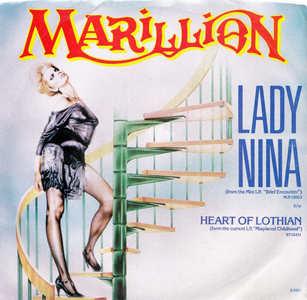
"Lady Nina" is a song by the British neo-prog band Marillion. First released in 1985 on the B-side to the #2 UK hit single "Kayleigh", it was the only single from the EP Brief Encounter released in the United States by Capitol Records in April 1986. A music video was also shot to promote it. While the EP climbed to #67 on the Billboard 200 album charts, "Lady Nina" did not make the Billboard Hot 100, but did reach #30 on the Mainstream Rock charts.

"Sugar Mice" is a song by British neo-prog band Marillion. It was released as the second single from their fourth studio album, Clutching at Straws (1987). Released on 13 July 1987, it peaked at number 22 in the UK Singles Chart, becoming the band's eighth top-30 hit in a row. Outside the UK, it charted in the Netherlands and West Germany.
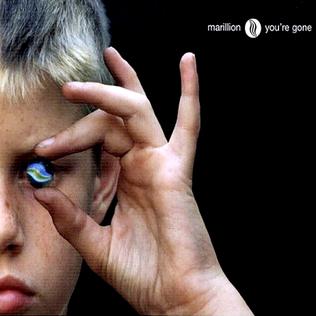
You're Gone is the lead single from Marillion's 13th studio album Marbles, released in 2004. The song marked a comeback for the band, reaching number 7 on the UK Singles Chart and becoming their first top ten hit since 1987's "Incommunicado". It also made number 8 on the Dutch Top 40.
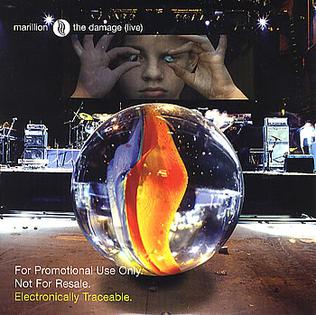
"The Damage" is a song by British neo-prog band Marillion which appeared on their 13th studio album, Marbles, released in May 2004. In October 2005, a one-disc live album containing a subset of the full two-disc studio version entitled Marbles Live was released to retail shops in the UK. The recording was made at the London Astoria in July 2004. To promote this album, the track "The Damage" was made available as a digital download; it is thus the third song to be released from Marbles and the only track to be released from Marbles Live. Download-only releases were not yet eligible to chart on the UK Singles Chart at the time, but the single did reach #2 on the UK Official Download Chart. There was no physical release available, but a one-track CD version was sent out as a promo.

"Cover My Eyes " is the lead single from the 1991 album Holidays in Eden by British neo-prog band Marillion. A straightforward pop song, it peaked at number 34 on the UK Singles Chart, but reached number 14 in the Netherlands, becoming the band's biggest hit there since "Kayleigh" (1985). The band performed on Top of the Pops on 6 June 1991, despite the song at the time being outside the top 40.
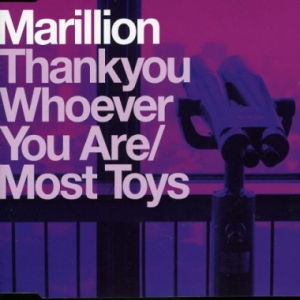
"Thankyou Whoever You Are" and "Most Toys" are songs recorded by British neo-prog band Marillion which appeared on their 14th studio album, Somewhere Else. They were released on a double A-side single in the United Kingdom and in the Netherlands in June 2007. "Thankyou" is a slow, slightly orchestral ballad arranged in the band's trademark style. In stark contrast, "Most Toys" is simple, rocky and fast, with an anti-consumerism message. It has a running time of 2:49, one of the band's shortest recordings to date, along with the musically similar "Hooks in You" from 1989).



















